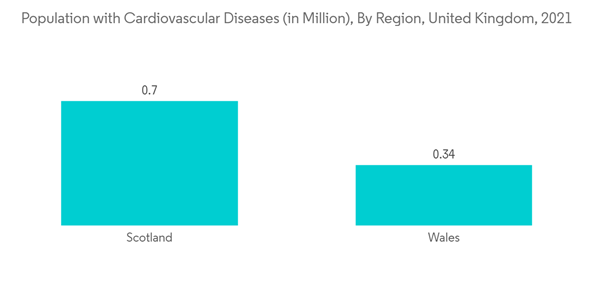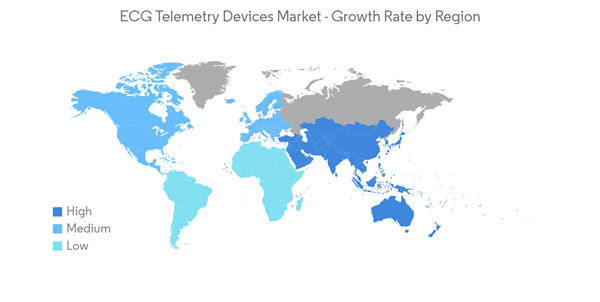The COVID-19 pandemic has significantly impacted market growth. The onset of the COVID-19 pandemic caused a nationwide lockdown with the suspension of non-urgent scheduled visits and hospitalizations, which resulted in the delayed diagnosis of patients with cardiac disorders. For instance, from an article published in Nature Medicine in February 2022, it has been observed that people with COVID-19 are more likely to have cardiovascular diseases such as heart failure, thromboembolic diseases, dysrhythmias, pericarditis, myocarditis, and ischemic and non-ischemic heart disease. Thus, the high burden of CVD-related diseases raised the demand for ECG telemetry, wearables, and patient monitoring devices during the pandemic. Moreover, an article published in PLOS One in August 2021 showed that the adjusted incident rate ratios for cardiovascular outcomes were considerably greater in the post-COVID-19 exposure period as compared to the pre-COVID-19 period. This raises the demand for devices that regularly monitors heart conditions to reduce the risk of a heart attack. Also, with the relaxed COVID-19 restrictions, resumed cardiac services, and increased patient visits, the studied market is expected to grow over the forecast period.
Factors such as the increasing prevalence of cardiovascular diseases, the growing geriatric population, and technological advancements in remote monitoring technologies are boosting market growth. For instance, as per BHF's 2022 report, more than 7.6 million people were living with cardiovascular diseases in the United Kingdom in 2021. Hence, cardiovascular diseases and their high prevalence is expected to increase the demand for regular monitoring of heart condition, propelling market growth.
Additionally, according to the March 2022 update of the Australian Bureau of Statistics, the prevalence of heart disease in Australia was 4.0% in 2020-2021, which equates to about 1 million people. Also, as per the same source, in Australia, heart disease increased with age, from 2.3% of people aged 45-54 years through to 23.2% of people aged 75 years and over, with males being the most affected by it in the country. Hence, the rising burden of CVDs, coupled with the increasing geriatric population, is expected to be the major driving factor for the growth of the market over the forecast period.
Furthermore, the increasing prevalence of obesity, diabetes, hypertension, and high cholesterol among the population is contributing to market growth. For instance, according to the 2021 data published by the OECD, about 47% of the population in the United States, 39% in Mexico, and 35% in Canada are expected to suffer from obesity by 2030. Also, according to the 2022 statistics published by IDF, about 537 million adults aged between 20-79 years were living with diabetes globally, and this number is projected to increase to 643 million and 783 million by 2030 and 2045, respectively. Therefore, high blood sugar caused by diabetes can damage the nerves that control the heart and blood vessels, leading to a variety of cardiovascular diseases like coronary artery disease and stroke, which can narrow the arteries. This is further expected to increase the demand for cardiac event monitoring and other telemetry devices, hence boosting market growth.
Moreover, the growing technological advancements in remote monitoring technologies are creating opportunities for companies to manufacture telemetry and remote patient monitoring devices. This increases the availability of products in the market, which is anticipated to fuel market growth. For instance, in January 2022, Royal Phillips introduced the first at-home 12-lead electrocardiogram (ECG) solution for use in decentralized clinical trials. Also, in July 2021, Abbott launched Jot Dx, an insertable cardiac monitor (ICM), in the United States. This technology allows for remote detection and improved diagnostic accuracy of cardiac arrhythmia in patients.
Therefore, owing to the above-mentioned factors, the studied market is expected to grow over the forecast period. However, the high cost of the devices and complex reimbursement policies in various countries are expected to impede the growth of the market over the forecast period.
ECG Telemetry Devices Market Trends
The Implantable Loop Recorder Segment is Expected to Hold a Major Market Share Over the Forecast Period
The implantable loop recorder segment is expected to witness significant growth in the ECG telemetry devices market over the forecast period owing to factors such as the growing prevalence of cardiac disorders, recent technological advancements in cardiac monitoring devices, and increasing demand for remote patient monitoring. An implantable loop recorder (ILP), also called a cardiac event recorder, is a type of heart-monitoring device that constantly records the heart rhythm for up to three years. It also allows doctors to remotely monitor the heartbeat. According to an article published in Cardiovascular Diagnosis and Therapy (CDT) in December 2021, it has been observed that ILP offers a significant supplemental diagnostic value for the identification and classification of benign and malignant arrhythmias in symptomatic CHD patients at risk of life-threatening cardiac events. Also, as per the same source, ILR implantation should be considered in patients with CHD of any complexity who need medium or long-term arrhythmia monitoring, especially if short-term Holter monitoring is unable to provide adequate diagnostic certainty. This is anticipated to increase the adoption of implantable loop recorders in patients suffering from a wide range of cardiovascular diseases, hence bolstering the segment's growth.Furthermore, the increasing adoption of remote patient monitoring (RPM) among patients due to the introduction of new reimbursement policies and the rising adoption of various business strategies such as collaborations, acquisitions, and others are also expected to increase the demand for ILP, hence boosting market growth. For instance, in January 2021, the CMS amended the 2021 Physician Fee Schedule to increase the reimbursement criteria for remote patient monitoring (RPM). This indicates wider adoption of RPM for cardiac monitoring, thereby increasing the demand for implantable loop recorders. Also, as per the AHA, recent clinical guidelines strongly recommend the use of remote patient monitoring for atrial fibrillation detection in both stroke and non-stroke patients, thereby further increasing the demand for implantable loop recorders, hence boosting the market growth. Moreover, in January 2021, Boston Scientific acquired Preventice Solutions for USD 925 million. With this acquisition, Boston expanded its business segment of core cardiac rhythm management and electrophysiology. Therefore, owing to the abovementioned factors, the studied segment is expected to grow over the forecast period.
North America is Expected to Hold Significant Market Share Over the Forecast Period
North America is expected to dominate the market over the forecast period. The factors attributed to the market's growth are the rising cardiovascular burden among the population, high healthcare expenditure along with reimbursement policies, and rising demand and adoption for ECG telemetry devices in the region.The increasing prevalence of cardiovascular diseases is the key factor driving the demand for ECG telemetry devices in the region. For instance, according to the statistics published by the AHA in June 2021, the prevalence rate of heart failure in Canada was between 1.5% to 1.9% in 2021. As per the same source, in an estimate, more than 130 million adults in the United States are expected to have some type of heart disease by 2035. Also, according to the 2022 data published by the CDC, heart disease is the leading cause of death in the United States, and every year, about 805,000 people in the United States have a heart attack. Thus, the high number of heart failure cases among the population increases the risk of atrial fibrillation and cardiac arrhythmias, which requires regular monitoring of the heart rate and oxygen saturation to prevent further risk to the heart, hence propelling the demand for ECG telemetry devices. Additionally, as per a research study published in the International Journal of Stroke in July 2021, it has been observed that about 6-12 million people in the United States are expected to suffer from atrial fibrillation by 2050 and 17.9 million people by 2060. Thus, the expected increase in the burden of cardiovascular-related health problems among the population is anticipated to fuel the demand for regular heart monitoring as well as a patient-parameters monitoring device. This is expected to propel the market's growth over the forecast period.
Furthermore, the technological advancements in patient monitoring devices, as well as the presence of key players in the region that are developing and launching products for helping patients with cardiovascular diseases, are expected to augment the market's growth over the forecast period. For instance, in July 2021, Abbott launched Jot Dx, an insertable cardiac monitor (ICM), in the United States. It allows remote detection and improved diagnostic accuracy of cardiac arrhythmia in patients. Also, Jot Dx is supported by SyncUP, a personalized service that offers one-on-one training and instruction to help patients become connected and stay connected to their ICM. Similarly, in July 2021, the US Food and Drug Administration approved Medtronic's two AccuRhythm artificial intelligence (AI) algorithms for use with the LINQ II insertable cardiac monitor (ICM). Therefore, owing to the abovementioned factors, the studied market is expected to grow over the forecast period.
ECG Telemetry Devices Industry Overview
The ECG telemetry devices market is fragmented in nature, and multiple companies are performing well in the market. However, some of the companies are contributing the most to this market and dominating certain geographies. With the rising focus on product development and the increasing usage of technology in healthcare, more small and mid-sized companies are expected to enter the market in the future. Some of the companies that are currently dominating the market are Aerotel Medical Systems Ltd, BioTelemetry Inc., GE Healthcare (GE Company), Medtronic Inc., iRhythm Technologies Inc., Nihon Kohden Corporation, Philips Healthcare, Medicalgorithmics SA, Preventice Solutions Inc., and Hill-Rom Services Inc. (Welch Allyn).Additional Benefits:
- The market estimate (ME) sheet in Excel format
- 3 months of analyst support
This product will be delivered within 2 business days.
Table of Contents
Companies Mentioned (Partial List)
A selection of companies mentioned in this report includes, but is not limited to:
- Aerotel Medical Systems Ltd
- BioTelemetry Inc.
- GE Healthcare (GE Company)
- Medtronic Inc.
- iRhythm Technologies Inc.
- Nihon Kohden Corporation
- Philips Healthcare
- Medicalgorithmics SA
- Preventice Solutions Inc.
- Hill-Rom Services Inc. (Welch Allyn)
- BIOTRONIK
- Boston Scientific Corporation










